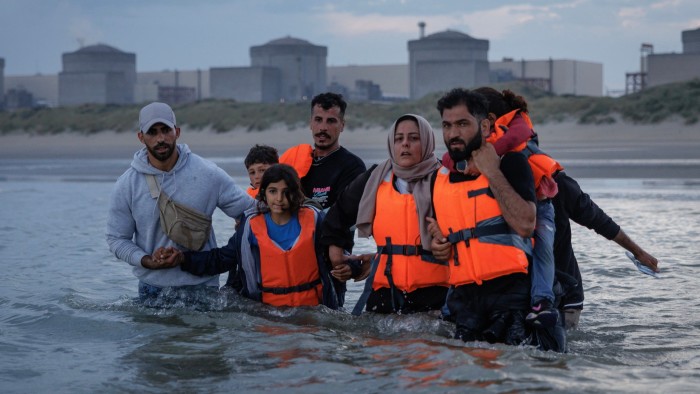Unlock the Editor’s Digest for free
Roula Khalaf, Editor of the FT, selects her favourite stories in this weekly newsletter.
Asylum seekers will be moved out of hotels and into barracks on former military bases, the UK government has said, as Sir Keir Starmer seeks to tackle the issue at the top of the political agenda after his sweeping cabinet reshuffle.
Defence secretary John Healey on Sunday confirmed that ministers were looking at using military sites as temporary accommodation for migrants who have crossed the English channel on small boats while they are processed.
“I recognise that the lack of confidence of the public over recent years in Britain’s ability to control its borders needs to be satisfied, and we have to deal with this problem in the small boats,” he told Sky News.
Healey also confirmed that the government was examining how to tighten the application and interpretation of the European Convention on Human Rights in relation to immigrants. The ECHR has previously been used to block the deportation of asylum seekers from Britain.
The initiatives mark an attempt by Starmer’s government to show it is actively addressing immigration, in particular boat crossings, which have risen to record levels this year and sparked protests across the country this summer outside hotels housing asylum seekers.
 Defence secretary John Healey and Conservative leader Kemi Badenoch on ‘Sunday with Laura Kuenssberg’ © Jeff Overs/BBC
Defence secretary John Healey and Conservative leader Kemi Badenoch on ‘Sunday with Laura Kuenssberg’ © Jeff Overs/BBC
Public concerns about levels of immigration — most of which is legal — have helped fuel support for Reform UK, Nigel Farage’s populist right-wing party, which has promised to enact “mass deportations” and take the UK out of the ECHR.
But the prime minister’s rightward shift on immigration risks alienating some left-wing voters who could switch to the Green party or a new vehicle being set up by former Labour leader Jeremy Corbyn.
After Angela Rayner resigned as deputy prime minister on Friday, Starmer brought forward a planned cabinet reshuffle to overhaul his ministerial team.
While former home secretary Yvette Cooper was moved sideways to become foreign secretary, the most striking element of the reshuffle was a clear-out of ministers from the Home Office, which is responsible for controlling immigration.
New home secretary Shabana Mahmood, a prominent figure on the right of the Labour party, is expected to take a more uncompromising approach to tackling immigration levels.
The government is close to agreeing a new “one in, one out” returns deal with Germany, according to Labour officials, similar to an accord recently struck with France — although work on this had begun under Cooper.
Starmer also used his reshuffle to sack Ellie Reeves, sister of chancellor Rachel Reeves, as Labour party chair, moving her to the more junior role of solicitor-general. Anna Turley, a former whip, replaced Reeves both as chair and as Cabinet Office minister without portfolio.
The prime minister sacked former farming minister Daniel Zeichner, local government minister Jim McMahon and business minister Justin Madders.
Other new appointments on Saturday included entrepreneur Jason Stockwood, who received a peerage to become the new investment minister after Baroness Poppy Gustafsson, former chief executive of UK cyber security company Darktrace, quit.
Stockwood, former head of dating website Match.com, is co-owner of Grimsby Town football club.
Starmer also replaced former business secretary Jonathan Reynolds with Peter Kyle, who on Saturday held a call with about 100 business leaders.
Kyle, previously science secretary, promised a closer “partnership” with UK plc and reiterated that ministers’ “number one mission” was economic growth, according to the government.
But some business leaders questioned the decision to move the “likeable” Reynolds, who had sought to build close relations with many executives after the government angered companies with tax rises in the Budget last October.
One chief executive said: “The problem with the last government was we spent too long having the same conversations with a revolving door of business ministers. They had billed this Reynolds, Reeves double act as for the long term.”
“Business will be quite disappointed because Johnny was definitely one of the most approachable in government,” said one other executive of Reynolds, who is now government chief whip.
Rayner’s previous role as deputy prime minister was handed to David Lammy, who also moved from foreign secretary to justice secretary.
Yet that does not preclude Labour from having a separate deputy leader of the party, who would be chosen in an open election by party members.
Manoeuvring is already beginning for that battle, with potential high-profile candidates likely to include high-profile “soft left” figures such as former transport secretary Louise Haigh, Tooting MP Rosena Allin-Khan and Dame Emily Thornberry, chair of the House of Commons foreign affairs committee.
